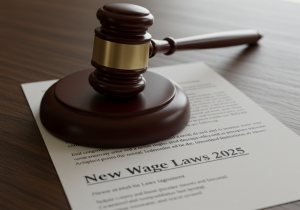Unpaid wages can be a serious issue in today’s labor market. For workers, it impacts financial stability and often leads to stress and frustration. However, the effects extend beyond employees. Businesses that fail to pay wages risk legal consequences and damage to their reputation. In this article, we will examine the financial and emotional toll unpaid wages have on workers and explore the legal, financial, and reputational impacts on businesses.
Understanding Unpaid Wages
Unpaid wages occur when employees don’t receive compensation for work they have completed. This can happen due to employer oversight, financial difficulties, or intentional withholding. Laws across states and at the federal level mandate timely wage payments, and failure to comply can lead to severe penalties for businesses.
Common Causes of Unpaid Wages
- Administrative Errors – Errors in payroll processing can result in employees not receiving their correct wages.
- Cash Flow Problems – Financial struggles may lead businesses to delay wage payments, risking further financial strain.
- Intentional Withholding – In some cases, employers may purposely withhold wages, which is illegal and can result in penalties.
By understanding these causes, employees can better recognize when wage violations occur, and businesses can work to prevent such issues through compliance and responsible financial practices.
The Financial and Emotional Toll on Workers
Financial Impact
When workers don’t receive timely pay, they are forced to make difficult financial decisions. This can lead to missed bill payments, debt accumulation, and even housing insecurity. The longer the unpaid wages persist, the greater the financial hardship, affecting all areas of life and, ultimately, their ability to work effectively.
Emotional Impact
The stress of not receiving expected wages can affect a worker’s mental health. They may experience anxiety, frustration, and decreased motivation at work. This emotional toll can extend to their family, affecting relationships and overall well-being. Studies have shown that financial stress can lead to health issues like high blood pressure and sleep disorders, further exacerbating the impact on workers’ lives.
Case Study: John Doe’s Experience with Unpaid Wages
Consider John Doe, a warehouse worker who faced wage delays for three months. During this period, John fell behind on mortgage payments, leading to a foreclosure notice. This example demonstrates how unpaid wages can disrupt lives, creating a ripple effect that is challenging to overcome.
Legal Risks for Businesses That Fail to Pay Wages
Businesses that fail to compensate their workers face significant legal risks. Wage and hour laws protect employees, and non-compliance can result in lawsuits, fines, and damages. Employers must understand these laws to avoid legal action and the costly repercussions associated with unpaid wages.
Potential Legal Consequences
- Class Action Lawsuits: Employees often band together to form class-action lawsuits, which can lead to large settlements and harm the company’s reputation.
- Government Penalties: Agencies such as the Department of Labor may impose fines or pursue legal action against businesses that violate wage laws.
- Increased Scrutiny: Once a company is found to have unpaid wages, it may attract further government scrutiny, increasing the likelihood of additional audits or investigations.
By understanding these legal risks, businesses can make proactive efforts to avoid unpaid wage claims and maintain compliance with labor laws.
Reputational Damage and Loss of Trust
When a business is known for wage violations, it can face severe reputational damage. News of unpaid wages can spread quickly, leading to negative publicity, especially with the accessibility of social media and online reviews. Potential clients, customers, and partners may hesitate to associate with a business known for mistreating its workers.
Rebuilding Trust After a Wage Violation
To repair reputation and restore trust, companies may need to take several actions:
- Transparency – Publicly acknowledge the issue and outline corrective measures.
- Employee Outreach – Address employee grievances directly and ensure clear, open communication.
- Enhanced Payroll Policies – Implement stricter controls and regular audits to prevent future incidents.
Through these actions, businesses can work to rebuild trust, although the reputational damage from unpaid wages may linger.
How Businesses Can Avoid Wage Violations
Preventing wage violations is crucial to maintaining a healthy work environment and avoiding the negative impacts discussed above. Here are some proactive steps businesses can take:
- Automate Payroll Processes
Using reliable payroll software can help reduce errors and ensure timely wage payments. - Conduct Regular Audits
Periodic payroll audits can identify discrepancies early and prevent unpaid wages from accumulating. - Establish a Financial Reserve
A reserve fund dedicated to payroll expenses can help businesses cover wages even during financial downturns, reducing the likelihood of wage delays. - Educate Management on Compliance
Training managers on wage and hour laws ensures they understand the importance of accurate and timely pay, reducing the risk of intentional or accidental non-compliance.
By taking these steps, businesses can create a more reliable payment system that respects employees’ rights and minimizes legal and financial risks.
What to Do If You’re Owed Unpaid Wages
For employees, understanding the steps to take when faced with unpaid wages is essential. Here are some general recommendations:
- Document Everything – Keep records of hours worked and pay received.
- Communicate with Your Employer – Approach your employer or HR department to resolve the issue amicably.
- Seek Legal Counsel – If the issue persists, consulting a labor attorney can help clarify your rights and potential legal actions.
- File a Complaint – Contacting the Department of Labor can lead to an investigation and possibly resolve the unpaid wages.
These steps offer employees a pathway to recover their wages while informing employers of their responsibilities to their workers.
Conclusion: Protecting Rights and Business Integrity
Unpaid wages harm both workers and businesses. For employees, they lead to financial and emotional strain, while for businesses, they open the door to legal and reputational risks. Addressing wage issues proactively benefits all parties involved, fostering trust, loyalty, and a healthier work environment. By upholding wage laws and prioritizing fair compensation, businesses not only protect their employees’ rights but also secure their own future stability and success.
Protect Your Rights with the Law Offices of David Gallo
If you’re facing unpaid wages, don’t navigate it alone. The experienced team at the Law Offices of David Gallo is here to help you understand your rights and recover the wages you deserve. Contact us today for a consultation and take the first step toward justice and fair compensation.






